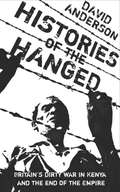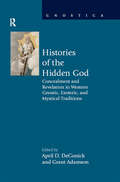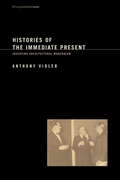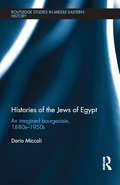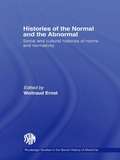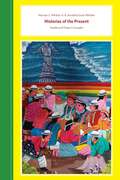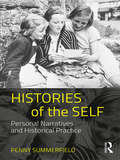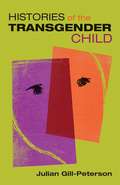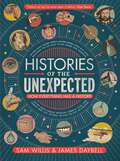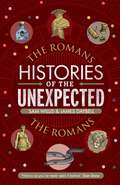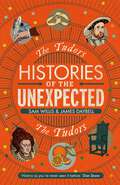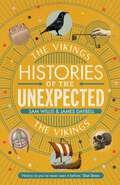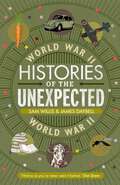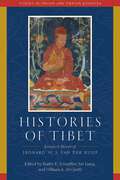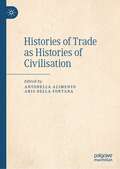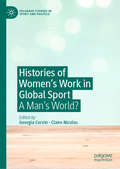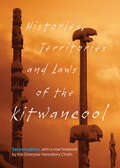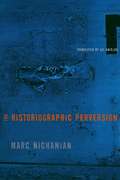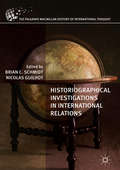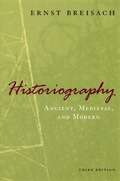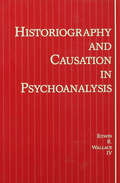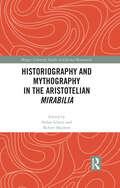- Table View
- List View
Histories of the Hanged: Britain's Dirty War in Kenya and the End of Empire
by David AndersonThe true story of the Mau Mau rebellion of 1952-60 in Kenya, told for the first timeThis book tells for the first time the story of the dirty war the British fought in Kenya, in the run-up to the country's independence in 1964. In 1952, after years of tension and bitterness, the grievances of the Gikuyu people of central Kenya exploded into open rebellion. Only 32 European settlers died in the subsequent fighting, but more than 1,800 African civilians, over 3,000 African police and soldiers, and 12,000 Mau Mau rebels were killed. Between 1953 and 1956 Britain sent over a thousand Kenyans to the gallows, often on trumped up or non-existent charges. Meanwhile 70,000 people were imprisoned in camps without trial for between two and six years. David Anderson provides a full and convincing account of a war in which all sides behaved badly, and therefore few of the combatants can be either fully excused, or blamed. These events are still within living memory, and eye-witness testimonies provide the backbone of this controversial story.
Histories of the Hanged: Britain's Dirty War in Kenya and the End of Empire
by David AndersonThe true story of the Mau Mau rebellion of 1952-60 in Kenya, told for the first timeThis book tells for the first time the story of the dirty war the British fought in Kenya, in the run-up to the country's independence in 1964. In 1952, after years of tension and bitterness, the grievances of the Gikuyu people of central Kenya exploded into open rebellion. Only 32 European settlers died in the subsequent fighting, but more than 1,800 African civilians, over 3,000 African police and soldiers, and 12,000 Mau Mau rebels were killed. Between 1953 and 1956 Britain sent over a thousand Kenyans to the gallows, often on trumped up or non-existent charges. Meanwhile 70,000 people were imprisoned in camps without trial for between two and six years. David Anderson provides a full and convincing account of a war in which all sides behaved badly, and therefore few of the combatants can be either fully excused, or blamed. These events are still within living memory, and eye-witness testimonies provide the backbone of this controversial story.
Histories of the Hidden God: Concealment and Revelation in Western Gnostic, Esoteric, and Mystical Traditions (Gnostica)
by April D. Deconick Grant AdamsonIn Western religious traditions, God is conventionally conceived as a humanlike creator, lawgiver, and king, a being both accessible and actively present in history. Yet there is a concurrent and strong tradition of a God who actively hides. The two traditions have led to a tension between a God who is simultaneously accessible to humanity and yet inaccessible, a God who is both immanent and transcendent, present and absent. Western Gnostic, esoteric, and mystical thinking capitalizes on the hidden and hiding God. He becomes the hallmark of the mystics, Gnostics, sages, and artists who attempt to make accessible to humans the God who is secreted away. 'Histories of the Hidden God' explores this tradition from antiquity to today. The essays focus on three essential themes: the concealment of the hidden God; the human quest for the hidden God, and revelations of the hidden God.
Histories of the Immediate Present: Inventing Architectural Modernism (Writing Architecture)
by Anthony VidlerHow the different narratives of four historians of architectural modernism—Emil Kaufmann, Colin Rowe, Reyner Banham, and Manfredo Tafuri—advanced specific versions of modernism. Architecture, at least since the beginning of the twentieth century, has suspended historical references in favor of universalized abstraction. In the decades after the Second World War, when architectural historians began to assess the legacy of the avant-gardes in order to construct a coherent narrative of modernism's development, they were inevitably influenced by contemporary concerns. In Histories of the Immediate Present, Anthony Vidler examines the work of four historians of architectural modernism and the ways in which their histories were constructed as more or less overt programs for the theory and practice of design in a contemporary context. Vidler looks at the historical approaches of Emil Kaufmann, Colin Rowe, Reyner Banham, and Manfredo Tafuri, and the specific versions of modernism advanced by their historical narratives. Vidler shows that the modernism conceived by Kaufmann was, like the late Enlightenment projects he revered, one of pure, geometrical forms and elemental composition; that of Rowe saw mannerist ambiguity and complexity in contemporary design; Banham's modernism took its cue from the aspirations of the futurists; and the “Renaissance modernism” of Tafuri found its source in the division between the technical experimentation of Brunelleschi and the cultural nostalgia of Alberti. Vidler's investigation demonstrates the inevitable collusion between history and design that pervades all modern architectural discourse—and has given rise to some of the most interesting architectual experiments of the postwar period.
Histories of the Jews of Egypt: An Imagined Bourgeoisie, 1880s-1950s (Routledge Studies in Middle Eastern History)
by Dario MiccoliUp until the advent of Nasser and the 1956 War, a thriving and diverse Jewry lived in Egypt – mainly in the two cities of Alexandria and Cairo, heavily influencing the social and cultural history of the country. Histories of the Jews of Egypt argues that this Jewish diaspora should be viewed as "an imagined bourgeoisie". It demonstrates how, from the late nineteenth century up to the 1950s, a resilient bourgeois imaginary developed and influenced the lives of Egyptian Jews both in the public arena, in institutions such as the school, and in the home. From the schools of the Alliance Israélite Universelle and the Cairo lycée français to Alexandrian marriage contracts and interwar Zionist newspapers – this book explains how this imaginary was characterised by a great capacity to adapt to the evolutions of late nineteenth and early twentieth century Egypt, but later deteriorated alongside increasingly strong Arab nationalism and the political upheavals that the country experienced from the 1940s onwards. Offering a novel perspective on the history of modern Egypt and its Jews, and unravelling too often forgotten episodes and personalities which contributed to the making of an incredibly diverse and lively Jewish diaspora at the crossroads of Europe and the Middle East, this book is of interest to scholars of Modern Egypt, Jewish History and of Mediterranean History.
Histories of the Normal and the Abnormal: Social and Cultural Histories of Norms and Normativity (Routledge Studies in the Social History of Medicine)
by Waltraud ErnstThis fascinating volume tackles the history of the terms 'normal' and 'abnormal'. Originally meaning 'as occurring in nature', normality has taken on significant cultural gravitas and this book recognizes and explores that fact. The essays engage with the concepts of the normal and the abnormal from the perspectives of a variety of academic disciplines – ranging from art history to social history of medicine, literature, and science studies to sociology and cultural anthropology. The contributors use as their conceptual anchors the works of moral and political philosophers such as Canguilhem, Foucault and Hacking, as well as the ideas put forward by sociologists including Durkheim and Illich. With contributions from a range of scholars across differing disciplines, this book will have a broad appeal to students in many areas of history.
Histories of the Present: People and Power in Ecuador
by Norman E. Whitten Dorothea Scott WhittenThe wellspring of critical analysis in this book emerges from Ecuador's major Indigenous Uprising of 1990 and its ongoing aftermath in which indigenous and Afro-Ecuadorian action transformed the nation-state and established new dimensions of human relationships. The authors weave anthropological theory with longitudinal Ecuadorian ethnography to produce a unique contribution to Latin American studies.
Histories of the Self: Personal Narratives and Historical Practice
by Penny SummerfieldHistories of the Self interrogates historians’ work with personal narratives. It introduces students and researchers to scholarly approaches to diaries, letters, oral history and memoirs as sources that give access to intimate aspects of the past. Historians are interested as never before in how people thought and felt about their lives. This turn to the personal has focused attention on the capacity of subjective records to illuminate both individual experiences and the wider world within which narrators lived. However, sources such as letters, diaries, memoirs and oral history have been the subject of intense debate over the last forty years, concerning both their value and the uses to which they can be put. This book traces the engagement of historians of the personal with notions of historical reliability, and with the issue of representativeness, and it explores the ways in which they have overcome the scepticism of earlier practitioners. It celebrates their adventures with the meanings of the past buried in personal narratives and applauds their transformation of historical practice. Supported by case studies from across the globe and spanning the fifteenth to twenty-first centuries, Histories of the Self is essential reading for students and researchers interested in the ways personal testimony has been and can be used by historians.
Histories of the Transgender Child
by Julian Gill-PetersonA groundbreaking twentieth-century history of transgender children With transgender rights front and center in American politics, media, and culture, the pervasive myth still exists that today’s transgender children are a brand new generation—pioneers in a field of new obstacles and hurdles. Histories of the Transgender Child shatters this myth, uncovering a previously unknown twentieth-century history when transgender children not only existed but preexisted the term transgender and its predecessors, playing a central role in the medicalization of trans people, and all sex and gender.Beginning with the early 1900s when children with “ambiguous” sex first sought medical attention, to the 1930s when transgender people began to seek out doctors involved in altering children’s sex, to the invention of the category gender, and finally the 1960s and ’70s when, as the field institutionalized, transgender children began to take hormones, change their names, and even access gender confirmation, Julian Gill-Peterson reconstructs the medicalization and racialization of children’s bodies. Throughout, they foreground the racial history of medicine that excludes black and trans of color children through the concept of gender’s plasticity, placing race at the center of their analysis and at the center of transgender studies.Until now, little has been known about early transgender history and life and its relevance to children. Using a wealth of archival research from hospitals and clinics, including incredible personal letters from children to doctors, as well as scientific and medical literature, this book reaches back to the first half of the twentieth century—a time when the category transgender was not available but surely existed, in the lives of children and parents.
Histories of the Unexpected: How Everything Has a History (Histories Of The Unexpected Ser.)
by James Daybell Sam Willis'History as you've never seen it before.' Dan Snow'A wonderful, eclectic and entertaining history of everything, full of fascinating, surprising stories.' Suzannah LipscombDid you know that the history of the beard is connected to the Crimean War; that the history of paperclips is all about the Stasi; and that the history of bubbles is all about the French Revolution? And who knew that Heinrich Himmler, Tutankhamun and the history of needlework are linked to napalm and Victorian orphans?In Histories of the Unexpected, Sam Willis and James Daybell lead us on a journey of discovery that tackles some of the greatest historical themes - from the Tudors to the Second World War, from the Roman Empire to the Victorians - but via entirely unexpected subjects.By taking this revolutionary approach, they not only present a new way of thinking about the past, but also reveal the everyday world around us as never before.
Histories of the Unexpected: The Romans (Histories of the Unexpected)
by Sam Willis James DaybellThe Histories of the Unexpected series not only presents a new way of thinking about the past, but also reveals the world around us as never before. Traditionally, the Romans have been understood in a straightforward way but the period really comes alive if you take an unexpected approach to its history. Yes, emperors, the development of civilization and armies all have a fascinating history . . . but so too do tattoos, collecting, fattening, recycling, walking, poison, fish, inkwells and wicked stepmothers! Each of these subjects is equally fascinating in its own right, and each sheds new light on the traditional subjects and themes that we think we know so well.
Histories of the Unexpected: The Tudors (Histories of the Unexpected)
by James Daybell Sam WillisThe Histories of the Unexpected series not only presents a new way of thinking about the past, but also reveals the world around us as never before. Traditionally, the Tudors have been understood in a straightforward way but the period really comes alive if you take an unexpected approach to its history. Yes, Tudor monarchs, exploration and religion have a fascinating history . . . but so too do cannibalism, shrinking, bells, hats, mirrors, monsters, faces, letter-writing and accidents! Each of these subjects is equally fascinating in its own right, and each sheds new light on the traditional subjects and themes that we think we know so well.
Histories of the Unexpected: The Vikings (Histories of the Unexpected)
by Sam Willis James DaybellThe Histories of the Unexpected series not only presents a new way of thinking about the past, but also reveals the world around us as never before. Traditionally, the Vikings have been understood in a straightforward way—but the period really comes alive if you take an unexpected approach to its history. Yes, ships, raiding and trade have a fascinating history, but so too do hair, break-ins, toys, teeth, mischief, luck and silk! Each of these subjects is equally fascinating in its own right, and each sheds new light on the traditional subjects and themes that we think we know so well.
Histories of the Unexpected: World War II (Histories of the Unexpected)
by James Daybell Sam WillisThe Histories of the Unexpected series not only presents a new way of thinking about the past, but also reveals the world around us as never before. Traditionally, World War II has been understood in a straightforward way but the period really comes alive if you take an unexpected approach to its history. Yes, battles, bombs and bravery all have a fascinating history . . . but so too do handkerchiefs, furniture, Mozart, insects, blood, mothers, suicide, darkness, cancer and puppets! Each of these subjects is equally fascinating in its own right, and each sheds new light on the traditional subjects and themes that we think we know so well.
Histories of Tibet: Essays in Honor of Leonard W. J. van der Kuijp
by Kurtis R. Schaeffer, Jue Liang, and William A. McGrathThe thirty-four essays in this volume follow the particular interests of Leonard van der Kuijp, whose groundbreaking research in Tibetan intellectual and cultural history imbued his students with an abiding sense of curiosity and discovery.As part of Leonard van der Kuijp&’s research in Tibetan history, as he patiently and expertly revealed treasures of the Tibetan intellectual tradition in fourteenth-century Tsang, or seventeenth-century Lhasa, or eighteenth-century Amdo, he developed an international community of colleagues and students. The thirty-four essays in this volume follow the particular interests of the honoree and express the comprehensive research that his international cohort have engaged in alongside his generous tutelage over the course of forty years. He imbued his students with the abiding sense of curiosity and discovery that can be experienced through every one of his writings, and that can be found as well in these new essays in intellectual, cultural, and institutional history by Christopher Beckwith, the late Hubert Decleer, Franz-Karl Ehrhard, Jörg Heimbel and David Jackson, Isabelle Henrion-Dourcy, Nathan Hill, Matthew Kapstein, Kurtis Schaeffer, Michael Witzel, Allison Aitken, Yael Bentor, Pieter Verhagen, Todd Lewis, William McGrath, Peter Schwieger, Gray Tuttle, and others.
Histories of Trade as Histories of Civilisation
by Antonella Alimento Aris Della FontanaThis edited collection explores the histories of trade, a peculiar literary genre that emerged in the context of the historiographical and cultural changes promoted by the histoire philosophique movement. It marked a discontinuity with erudition and antiquarianism, and interacted critically with universal history. By comparing and linking the histories of individual peoples within a common historical process, this genre enriched the reflection on civilisation that emerged during the long eighteenth century. Those who looked to the past wanted to understand the political constitutions and manners most appropriate to commerce, and grasp the recurring mechanisms underlying economic development. In this sense, histories of trade constituted a declination of eighteenth-century political economy, and thus became an invaluable analytical and practical tool for a galaxy of academic scholars, journalists, lawyers, administrators, diplomats and government ministers whose ambition was to reform the political, social and economic structure of their nations. Moreover, thanks to these investigations, a lucid awareness of historical temporality and, more particularly, the irrepressible precariousness of economic hegemonies, developed. However, as a field of tension in which multiple and even divergent intellectual sensibilities met, this literary genre also found space for critical assessments that focused on the ambivalence and dangers of commercial civilisation. Examining the complex relationship between the production of wealth and civilisation, this book provides unique insights for scholars of political economy, intellectual history and economic history.
Histories of Women's Work in Global Sport: A Man’s World? (Palgrave Studies in Sport and Politics)
by Georgia Cervin Claire NicolasSport has never been a man’s world. As this volume shows, women have served key roles not only as athletes and spectators, but as administrators, workers, decision-makers, and leaders in sporting organizations around the world. Contributors excavate scarce archival material to uncover histories of women’s work in sport, from swimming teachers in nineteenth-century England to national sports administrators in twentieth-century Côte d’Ivoire, and many places in between. Their work has been varied, holding roles as teachers, wives, and secretaries in sporting contexts around the world, often with diplomatic functions—including at the 1968 and 1992 Olympic Games. Finally, this collection shows how gender initiatives have developed in sporting institutions in Europe and international sport federations today. With a foreword by Grégory Quin and afterword by Anaïs Bohuon, this is a pioneering study into gender and women’s work in global sport.
Histories, Territories and Laws of the Kitwancool: Second Edition, with a New Foreword by the Gitanyow Hereditary Chiefs
by Maggie Good B. W. McKilvington Peter Williams Walter Derrick Solomon Good Walter Douse Ernest Smith Fred GoodA new edition of the groundbreaking 1958 publication created in collaboration with the Gitanyow Hereditary Chiefs.This beautiful new edition of the histories and laws of the Gitanyow (literally “people of the small/narrow place,” once called the Kitwancool in settler accounts), as recounted to museum curator Wilson Duff in 1958, includes a new foreword by Gitanyow Hereditary Chiefs while preserving the original text. Until the mid-twentieth century, the village of Kitwancool (now Gitanyow) was only accessible to outsiders by trail. This inaccessibility of territory protected a deeply independent spirit and unique legal system, recorded here as part of an agreement that allowed for the removal of Gitanyow totem poles to the Royal BC Museum for preservation. The complete histories of the Gitanyow, told in their own words, were also translated and recorded here as part of the same agreement.This publication not only captures the histories, territories and laws of the Gitanyow, but also a significant moment in time for settler-Indigenous relations, and the origin story for totem poles still standing at the Royal BC Museum today.Histories, Territories and Laws of the Kitwancool is a must-read for anyone who wants to understand Gitanyow society and belief.
The Historiographic Perversion
by Gil Anidjar Marc NichanianGenocide is a matter of law. It is also a matter of history. Engaging some of the most disturbing responses to the Armenian genocide, Marc Nichanian strikingly reveals the complex role played by law and history in making this and other genocides endure as contentious events. Nichanian's book argues that both law and history fail to contend with the very nature of events for which there is no archive (no documents, no witnesses). Both history and law fail to address the modern reality that events can be-and are now being-perpetrated that depend upon the destruction of the archive, turning monstrous deeds into nonevents. Genocide, this book makes us see, is in one sense the destruction of the archive. It relies on the historiographic perversion.
The Historiographic Perversion
by Marc NichanianGenocide is a matter of law. It is also a matter of history. Engaging some of the most disturbing responses to the Armenian genocide, Marc Nichanian strikingly reveals the complex role played by law and history in making this and other genocides endure as contentious events.Nichanian's book argues that both law and history fail to contend with the very nature of events for which there is no archive (no documents, no witnesses). Both history and law fail to address the modern reality that events can be-and are now being-perpetrated that depend upon the destruction of the archive, turning monstrous deeds into nonevents. Genocide, this book makes us see, is in one sense the destruction of the archive. It relies on the historiographic perversion.
Historiographical Investigations in International Relations (The Palgrave Macmillan History of International Thought)
by Brian C. Schmidt Nicolas GuilhotThis book critically investigates the historiography of International Relations. For the past fifteen years, the field has witnessed the development of a strong interest in the history of the discipline. The chapters in this edited volume, written by some of the field’s preeminent disciplinary historians, all manifest the best of an innovative and exciting generation of scholarship on the history of the discipline of International Relations. One of the objectives of this volume is to take stock of the historical turn. Yet this volume is not simply a stock-taking exercise, as it also intends to identify the limitations and blind spots of the recent historiographical literature. The chapters consider a range of diverse thinkers and examine their impact on understanding various dimensions of the field’s history.
Historiography: Ancient, Medieval, and Modern
by Ernst BreisachIn this pioneering work, Ernst Breisach presents an effective, well-organized, and concise account of the development of historiography in Western culture. Neither a handbook nor an encyclopedia, this up-to-date third edition narrates and interprets the development of historiography from its origins in Greek poetry to the present, with compelling sections on postmodernism, deconstructionism, African-American history, women's history, microhistory, the Historikerstreit, cultural history, and more. The definitive look at the writing of history by a historian, Historiography provides key insights into some of the most important issues, debates and innovations in modern historiography.
Historiography: Ancient, Medieval, and Modern
by Ernst BreisachIn this pioneering work, Ernst Breisach presents an effective, well-organized, and concise account of the development of historiography in Western culture. Neither a handbook nor an encyclopedia, this up-to-date third edition narrates and interprets the development of historiography from its origins in Greek poetry to the present, with compelling sections on postmodernism, deconstructionism, African-American history, women’s history, microhistory, the Historikerstreit, cultural history, and more. The definitive look at the writing of history by a historian, Historiography provides key insights into some of the most important issues, debates and innovations in modern historiography. Praise for the first edition: “Breisach’s comprehensive coverage of the subject and his clear presentation of the issues and the complexity of an evolving discipline easily make his work the best of its kind.”—Lester D. Stephens, American Historical Review
Historiography and Causation in Psychoanalysis
by Edwin R. Wallace, IVWhat do the psychoanalyst and the historian have in common? This important question has stimulated a lively debate within the psychoanalytic profession in recent years, bearing as it does on the very nature of the psychoanalytic enterprise. Edwin Wallace, a clinician with training in the history and philosophy of science, brings a ranging scholarly perspective to the debate, mediating between rival perspectives and clarifying the issues at stake in the process of offering his own thoughtful conception of the historical nature of psychoanalysis. For Wallace, the procedures, problems, and interpretive possibilities of psychoanalysis and history are strikingly constant and mutually illuminating. He insists, further, that the fundamentally historical nature of psychoanalysis poses no threat to its scientific dignity. In arriving at this verdict, Wallace pushes beyond his expansive treatment of the many parallels between history and psychoanalysis to a systematic consideration of the problem of causation in both disciplines. Tracing the historical background of causation in science, philosophy, history, and analysis, he offers a logical analysis of determinism and a critique of causal language in psychoanalysis while adumbrating the historical character of psychoanalytic explanation. Historiography and Causation in Psychoanalysis is a thought-provoking work that cuts across disciplinary boundaries. It will cultivate the historical sensibilities of all its clinical readers, broadening and deepening the intellectual perspective they bring to the dialogue about the nature of psychoanalytic work. Timely and rewarding reading for analysts, psychiatrists, and clinical psychologists, it will be welcomed by historians and philosophers as well.
Historiography and Mythography in the Aristotelian Mirabilia (Rutgers University Studies in Classical Humanities)
by Stefan Schorn Robert MayhewThis is the first full-length volume in English that focuses on the historiographical section of the Mirabilia or De mirabilibus auscultationibus (On Marvelous Things Heard), attributed to Aristotle but not in fact by him. The central section of the Mirabilia, namely §§ 78–151, for the most part deals with historiographical material, with many of its entries having some relationship to ancient Greek historians of the 4th and 3rd centuries BC. The chapters in this volume discuss various aspects of this portion of the text, including textual issues involving toponyms; possible structural principles behind the organization of this section; the passages on Theopompus and Timaeus; mythography; the philosopher Heracleides of Pontos; Homeric exegesis; and the interrelationship between pseudo-Plutarch’s On Rivers, a section of the historian Stobaeus’ Geography, and the Mirabilia. Historiography and Mythography in the Aristotelian Mirabilia is an invaluable resource for scholars and students of this text, and of Greek philosophy, historiography, and literature more broadly.
